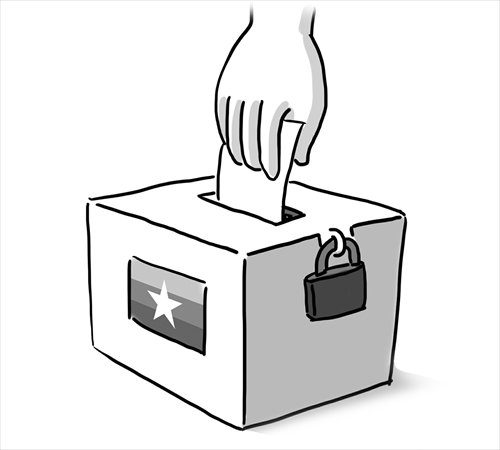Fair representation of ethnic minorities tested by Myanmese vote

Illustration: Liu Rui/GT
The 2015 elections in Myanmar will be closely watched by many observers at home and abroad. Should they be free and fair, the polls on Sunday could have a profound impact on the future of the country.
Hopes are high in opposition circles that the National League for Democracy (NLD), headed by Nobel Peace Prize winner Aung San Suu Kyi, will win the elections and secure enough seats to nominate the future president. Ethnic nationality parties are also likely to do well in the country's ethnic states, but will not be able to have a major impact on national level politics under the current political system.
Myanmar has been at civil war since 1948, and has been ruled by the military government since 1962. The introduction of a new political system in 2011 and the reform process initiated by President U Thein Sein have raised domestic and international hopes that finally a solution to the country's long-standing instability can be found. If so, the 2015 elections could mean a further shift away from military rule toward a civilian government, and a step toward giving ethnic minorities a greater political voice.
Unlike the 2010 general elections, the 2015 polls may be the first credible elections in decades. In a break with policies of the past, the Thein Sein government has allowed various international agencies and foreign diplomats to monitor and observe the elections.
However, there are several serious challenges. For one, the elections take place under the controversial 2008 Constitution, drafted under the previous military government. This automatically gives the military 25 percent of seats. In order to further protect military interests, constitutional amendments require a 75 percent majority, giving military representatives a crucial veto opportunity. Finally, the constitution prohibits anyone married to a foreigner from becoming president. This is an unusual clause that seems to have been designed to exclude NLD leader Suu Kyi.
Efforts in June 2015 by opposition parties in parliament to change the constitution to make it more democratic were all vetoed by military representatives. This has presented pro-democracy parties with a dilemma over how far to cooperate with the new political system.
For ethnic parties, several issues stand out. Decades of civil war and military rule have caused great suffering for ethnic minority peoples. This has led to deep mistrust of the central government. As a result, voting is likely to be along nationality lines in most non-Burman regions, especially in rural areas. Under Myanmar's first-past-the-post electoral system, the result could well be vote-splitting that will benefit other parties, especially the NLD and the USDP.
A further impediment to ethnic representation in the polls is continuing conflict in several borderland areas where over half a million civilians are displaced from their homes. Despite the promise by Thein Sein to bring peace, fighting has resumed during the past four years in the north of the country.
For many citizens, this raises serious questions about the sincerity of the government and its ability to control the Myanmar armed forces. As a result of the fighting, the election commission has cancelled the polls in a number of ethnic areas. But there have been accusations that the cancellations are intended to benefit the ruling USDP.
Equally concerning is the exclusion from citizenship and voting rights of hundreds of thousands of Muslims, especially in the Rakhine State, where many of them self-identify as Rohingya. Many thousands of Kokang, Wa and other minorities, including those with perceived Chinese ancestry, have also been disenfranchised.
The stage is thus delicately set. The 2015 elections, if fairly and successfully held, could mark a further step toward democratization and increased ethnic rights. But in order to address the legacy of conflict and military rule, it is vital that political and economic reforms continue in inclusive ways. Solutions to Myanmar's many grave challenges can only be found through reconciliation and political dialogue - not through coercion, division and a new generation of grievances.
The author is a political scientist with the Transnational Institute. He has over 15 years of working experience on Myanmar and its border regions. opinion@globaltimes.com.cn